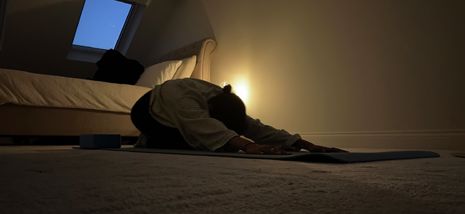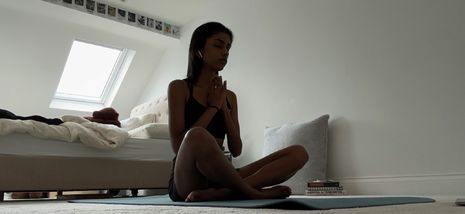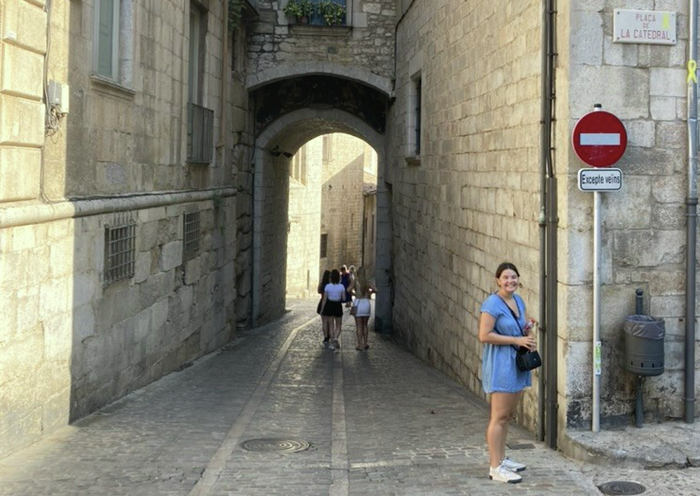Yoga is a ‘union between body and mind’
Caitlin Rajan talks about the power of yoga in restoring her relationship with her body and her mind, in the face of a battle against physical illness

Bodies are complicated, messy, and unpredictable. This was a fact I had to grapple with when illness struck. Many of us like to think our bodies are within the realm of our own control and, in a world that demands perfection, the body seems to be the ultimate punching bag. It is treated as clay, out of which one can carve whatever impression of themselves they desire to. Yet, upon falling ill, I quickly realised that the quest for control over the corporeal is ever-alluding. As a self-proclaimed control freak, this was a tough pill to swallow. As if all the plates I was juggling henceforth weren’t already teetering, this one dish I thought I had complete mastery over had crashed to the ground and shattered to pieces.
It is naturally hard to make peace with one’s body in these times. No longer was I meandering the streets of Cambridge, gossiping with friends in coffee shops, or bouncing on my heels in MASH until I had vodka lemonade spilled down my top. Now I was floating from hospital to hospital, nurses jabbing needles in my veins or rubbing strange solutions on my body to patch me up with wires, my eyes fixated on monitors landscaping all the ways in which my body was going awry. I saw my body and myself as if in a funhouse mirror; warped, distorted, and barely resembling what I once knew. A fear kept nagging at me, a question that was my waking thought and recurring nightmare: would I live forever feeling so alienated yet so trapped within my own body?

“Embodiment” was a word thrown around in my very first yoga class. Em-bod-i-ment. Those four syllables, elongated and glorious from the mouth of my teacher, seemed to fall upon closed ears in my case. What did it mean to be embodied? To be able to feel your body? To be aware of it? I didn’t know. What I did know was that I sucked at yoga. I was wobbling from side to side and contorting into ways I thought impossible, as graceful as a deer on a sheet of ice. Meanwhile, my yoga instructor, with her matching Lycra two-piece and slicked-back bun of shining hair, was gliding through the routine effortlessly, without a taut limb displaced; a harsh juxtaposition that left me feeling somewhat disheartened.
Yet yoga, I soon found, was not about results but about process. Process. Something that had been lost to me in the preceding months. In fact, my whole life, I had come to realise, had been so result-oriented. My health was just another instance of this, where I constantly envisioned the day I would be “well again” in the faraway future. In yoga, though, I could not think so distantly. Send your mind too far into the future, my teacher would say, and you’ll lose your footing in the present.
“I suddenly craved to spend more time with my body and within my own mind”
I began practising yoga more often. Like Alice, I was lost in yogi wonderland. I researched all things yoga, discovering new varieties, from Yin to Bikram to Vinyasa. I read lengthy translations of the Upanishads, uncovering the spirituality within yoga. Above all, I was struck by the etymology of “yoga” itself. Deriving from the Sanskrit “yuj”, approximately translating to “to join”, the word “yoga” can be understood as “to unite” or “union”. In particular, a union between body and mind, where, through the practice of yoga, the two are brought together in perfect harmony.
When I practise yoga, there is a moment at the end of each practice where we lay on our backs, eyes closed and just breathing. In those moments, I recall a particular image. I see the clinic I visit often, where there’s a quote printed on a slightly torn sheet of A4 paper, at the centre of a dusty blue pin board that hangs slightly lopsided from a single rusty gold push pin. From de Beauvoir’s The Second Sex, the quote reads: “The body is the instrument of our hold on the world.”
Learning to love one’s body, I maintain, is a near impossible task. However, learning to respect your body is a much easier feeling to cultivate. Yoga, in this way, didn’t transform my body so much as it transformed my mind. It loosened inhibitions and lowered walls, teaching me to be open to just how much I could be capable of when I worked with my body, not against it. As the root of the word suggests, yoga granted me a picture of health as holistic, where I was, as if healing fractures, bridging the once wide gaps between my body and mind and bringing them into a perfect harmony.
“It is as though I am not seeing my body as an ornament, but as an agent”
I feel for the first time, as I look at my own body, that I am finally seeing myself. Crucially, yoga allowed me to realise that my illness is not my weakness. If anything, it helped me recognise my strength. So, yes, my body is complicated, messy, and unpredictable, but above all it is so incredibly enduring.
 News / Cambridge students set up encampment calling for Israel divestment6 May 2024
News / Cambridge students set up encampment calling for Israel divestment6 May 2024 News / Cambridge postgrad re-elected as City councillor4 May 2024
News / Cambridge postgrad re-elected as City councillor4 May 2024 News / Proposed changes to Cambridge exam resits remain stricter than most7 May 2024
News / Proposed changes to Cambridge exam resits remain stricter than most7 May 2024 News / Some supervisors’ effective pay rate £3 below living wage, new report finds5 May 2024
News / Some supervisors’ effective pay rate £3 below living wage, new report finds5 May 2024 Fashion / Class and closeted identities: how do fits fit into our cultures?6 May 2024
Fashion / Class and closeted identities: how do fits fit into our cultures?6 May 2024






